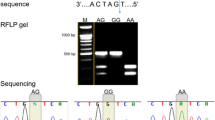Abstract
Klotho gene is an important gene involved in calcium homeostasis, and polymorphisms of this gene may render the individual prone to renal stone formation. We evaluated G395A single nucleotide polymorphisms (SNPs) of Klotho gene at rs1207568 in renal stone patients of North India. This was a prospective study involving 150 patients of renal stone disease (aged 15–60 years) and 100 age- and sex-matched controls. The DNA was isolated and subjected to polymerase chain reaction (PCR) for identifying the G395A Klotho SNPs at rs1207568. Confronting two pair primers were used, and gel electrophoresis showing two bands at 175,252 bp was considered as GG genotype, three bands at 121,175 and 252 bp as GA and two bands at 121 and 252 bp as AA genotype. The association between genotype and cases was evaluated by using Chi-square test and logistic regression analysis. Cases and controls were well matched for age (40.65 vs 42.06, p = 0.063) and sex (p = 0.420). Significantly high proportion of patients with renal stones had GG genotype as compared to controls (odds ratio (OR) 2.37(1.39,4.03), p = 0.001). None of the participants (cases and controls) had homozygous recessive AA genotype. The risk of stone formation was significantly higher in the population carrying G allele {OR 1.94 (1.225–3.073), p 0.004}. Mean serum calcium was higher in stone formers with GG genotype as compared to those with GA genotype (9.16 mg/dl vs 8.91 mg/dl; p = 0.06). GG genotype of G396A Klotho gene SNPs is associated with renal stone formation. The G allele carrier is twice at risk of renal stone formation. The absence of AA genotype in north-western Indian population remains a curiosity.


Similar content being viewed by others
References
Romero V, Akpinar H, Assimos DG (2010) Kidney stones: a global picture of prevalence, incidence, and associated risk factors. Rev Urol 12(2–3):e86
Monico CG, Milliner DS (2012) Genetic determinants of urolithiasis. Nat Rev Nephrol 8(3):151
Amar A, Afzal A, Hussain SA et al (2019) Association of vitamin D receptor gene polymorphisms and risk of urolithiasis: results of a genetic epidemiology study and comprehensive meta-analysis. Urolithiasis. https://doi.org/10.1007/s00240-019-01157-7 (published online ahead of print, Sep 12)
Ganesamoni R, Singh SK (2012) Epidemiology of stone disease in Northern India. In: Talati J, Tiselius HG, Albala D, Ye Z (eds) Urolithiasis. Springer, London, pp 39–46
Pedro RN, Aslam AU, Bello JO et al (2020) Nutrients, vitamins, probiotics and herbal products: an update of their role in urolithogenesis. Urolithiasis 48(4):285–301
Chang Q, Hoefs S, van der Kemp AW, Topala CN, Bindels RJ, Hoenderop JG (2005) The beta-glucuronidase KLOTHO hydrolyzes and activates the TRPV5 channel. Science 310(5747):490–493
Lu P, Boros S, Chang Q, Bindels RJ, Hoenderop JG (2008) The β-glucuronidase klotho exclusively activates the epithelial Ca2+ channels TRPV5 and TRPV6. Nephrol Dial Transpl 23(11):3397–3402
John GB, Cheng CY, Kuro-o M (2011) Role of Klotho in aging, phosphate metabolism, and CKD. Am J Kidney Dis 58(1):127–134
Andrukhova O, Smorodchenko A, Egerbacher M et al (2014) FGF 23 promotes renal calcium reabsorption through the TRPV 5 channel. EMBO J 33(3):229–246
Kuro-o M (2009) KLOTHO and aging. Biochim Biophys Acta 1790(10):1049–1058
Kurosu H, Ogawa Y, Miyoshi M et al (2006) Regulation of fibroblast growth factor-23 signalling by KLOTHO. J Biol Chem 281(10):6120–6123
Ali A, Tursun H, Talat A et al (2017) Association study of KLOTHO gene polymorphism with Calcium oxalate stones in the Uyghur population of Xinjiang, China. Urol J 14(1):2939–2943
Gürel A, Üre İ, Temel HE et al (2016) The impact of KLOTHO gene polymorphisms on urinary tract stone disease. World J Urol 34(7):1045–1050
Ansari MS, Gupta NP, Hemal AK, Dogra PN, Seth A, Aron M et al (2005) Spectrum of stone composition: structural analysis of 1050 upper urinary tract calculi from northern India. Int J Urol 12:12–16
Sorokin I, Mamoulakis C, Miyazawa K, Rodgers A, Talati J, Lotan Y (2017) Epidemiology of stone disease across the world. World J Urol 35(9):1301–1320
Telci D, Dogan AU, Ozbek E et al (2011) KLOTHO gene polymorphism of G395A is associated with kidney stones. Am J Nephrol 33(4):337–343
Kawano K, Ogata N, Chiano M et al (2002) KLOTHO gene polymorphisms associated with bone density of aged postmenopausal women. J Bone Miner Res 17:1744–1751
Kuro-o M, Matsumura Y, Aizawa H et al (1997) Mutation of the mouse KLOTHO gene leads to a syndrome resembling ageing. Nature 390(6655):45–51
Xu C, Song RJ, Yang J et al (2013) KLOTHO gene polymorphism of rs3752472 is associated with the risk of urinary calculi in the population of Han nationality in Eastern China. Gene 526(2):494–497
Funding
None.
Author information
Authors and Affiliations
Contributions
LP contributed to data collection, data analysis and manuscript writing and editing. DSK and SSK was involved in protocol/project development and manuscript writing and editing. SD performed data collection and analysis. KJ performed protocol/project development and data collection.
Corresponding author
Ethics declarations
Conflict of interest
The authors declare that they have no conflict of interest.
Statement of human rights
This research involved human participants and the study protocol was approved by the institute’s ethics committee. We certify that the study was performed in accordance with the ethical standards as laid down in the 1964 Declaration of Helsinki and its later amendments or comparable ethical standards.
Statement on the welfare of animals
This article does not contain any studies with animals performed by any of the authors.
Informed consent
Informed consent was obtained from all individual participants included in the study.
Additional information
Publisher's Note
Springer Nature remains neutral with regard to jurisdictional claims in published maps and institutional affiliations.
Rights and permissions
About this article
Cite this article
Lanka, P., Devana, S.K., Singh, S.K. et al. Klotho gene polymorphism in renal stone formers from Northwestern India. Urolithiasis 49, 195–199 (2021). https://doi.org/10.1007/s00240-020-01226-2
Received:
Accepted:
Published:
Issue Date:
DOI: https://doi.org/10.1007/s00240-020-01226-2



